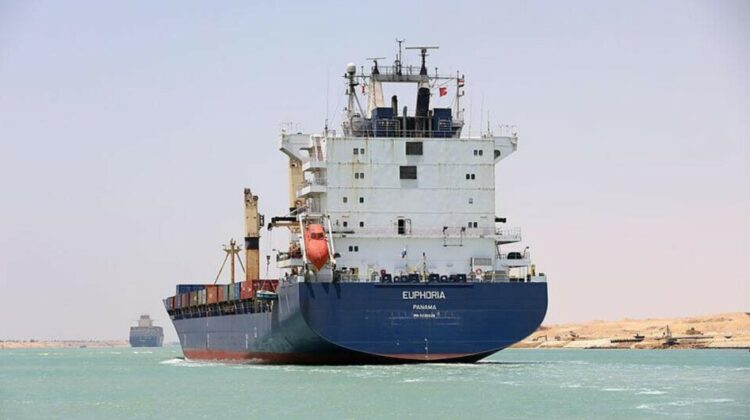
Update port closure 2.11.23
16.05.2025
Price jumps in rates Far East – Europe
16.05.2025Houthi attacks endanger maritime supply chains
In recent days, there have been several attacks on cargo ships in the Red Sea by Yemeni rebels. Experts warn that the transport of goods through this crucial trade route is increasingly being disrupted. Meanwhile, the shipping companies Hapag-Lloyd, Maersk, CMA CGM, and most recently MSC have decided to avoid the route.
More and more shipping companies are avoiding the Suez Canal route until further notice due to the Houthi attacks. (Photo: picture alliance / Xinhua News Agency | Ahmed Gomaa)
December 15, 2023 (updated on December 18, 2023, 7:12 a.m.) | by Sebastian Reimann
Attacks by Yemeni Houthi rebels on merchant ships in the Red Sea are now commonplace. One month after the hijacking of the car carrier “Galaxy Leader,” there have been several attempted and partly successful attacks using drones and anti-ship missiles on various types of vessels. On Tuesday, the tanker “Strinda” was hit, and on Wednesday and Thursday, missiles narrowly missed the product tanker “Ardmore Encounter” and the “Maersk Gibraltar.” On Friday, Hapag-Lloyd’s 15,000-TEU container ship “Al Jasrah” was hit. However, it was apparently able to continue its journey.
The attacks are having an impact: The container shipping companies Hapag-Lloyd, CMA CGM, Maersk, and MSC have now decided to stop using the Suez Canal route until further notice. Until the Red Sea can be safely navigated again, the ships must take the alternative route around the Cape of Good Hope.
The attacks, against the backdrop of the war between Israel and the Palestinian Hamas, are increasingly threatening the smooth transport of goods through this crucial trade route and thus also international trade. After all, around 10 percent of the world’s traded goods pass through the Suez Canal between the Red Sea and the Mediterranean. Around 50 ships pass through it every day. And the Strait of Bab el-Mandeb at the other end of the Red Sea, at the gateway to the Gulf of Aden, where the most recent attacks were recorded, is reportedly used by 1,500 ships per month.
Suez Canal closure cannot be completely ruled out
Peter Sand, chief analyst at the freight platform Xeneta, is therefore already warning of a possible closure of the Suez Canal. It is not likely, he emphasizes, but it cannot be ruled out either. Following the experience with the “Ever Given” in 2021 and the consequences of the blockage of the canal at that time, the shipping industry is very concerned about a possible similar scenario. The current situation could therefore have serious consequences for global supply chains.
Accordingly, the maritime industry is increasing pressure on politicians to take swift action to improve the security situation. The European Shipowners’ Association (ECSA) and the European Transport Workers’ Union (ETF) called for “immediate action” on Friday. “The lives and safety of our seafarers are at risk as attacks increase daily. Seafarers are the beating heart of the shipping industry, and their ability to perform their duties without fear for their safety is crucial,” the ETF stated. ECSA also emphasized that shipping is the cornerstone of European security – “from energy to food supplies and supply chain security.”
On Thursday, the German Shipowners’ Association (VDK) had already called for protection against the Houthi attacks. “Germany and the European Union must take the situation very seriously,” said VDR General Manager Martin Kröger.
Ships are already being diverted
This is all the more true given that the first effects on maritime traffic are already being observed. Danish shipping expert Lars Jensen of Vespucci Maritime reported on Friday on the social network LinkedIn that several major liner shipping companies had turned back ships that were en route to the crisis region. Another possible consequence, he said, could be that the carriers could reroute ships around southern Africa. Some Israeli ships have reportedly already chosen this route, albeit at the cost of significantly longer transport times. The detour is expected to add about twelve days to the journey.
To make matters worse, the Panama Canal, the second waterway crucial for east-west traffic, cannot be fully utilized due to the ongoing low water situation. Accordingly, the Suez Canal is currently experiencing particularly heavy traffic.
Rising risk premiums and surcharges
The consequences of the increased attacks are already being felt in the insurance markets, which in turn is impacting transport prices. According to experts, the cost of insurance coverage has doubled, and for Israeli shipowners, it has more than tripled, assuming they still receive coverage at all. Various shipping companies have responded by imposing a “War Risk Surcharge” of $50 to $100 per container to pass on the increased risk premiums.
Neil Roberts, Head of Marine and Aviation at Lloyd’s Market Association and Chairman of the Policy Forum at the international insurance association IUMI, sees the attack on the “Galaxy Leader,” which has now been followed by numerous others, as a “watershed moment.” This requires a rethinking of ship security, as such an incident “is not foreseen in any merchant ship safety procedure manual.” As a result, trade in the region has entered another phase of risk and uncertainty, in which political motives collide with commercial operations, he writes in a post for the IUMI blog.



